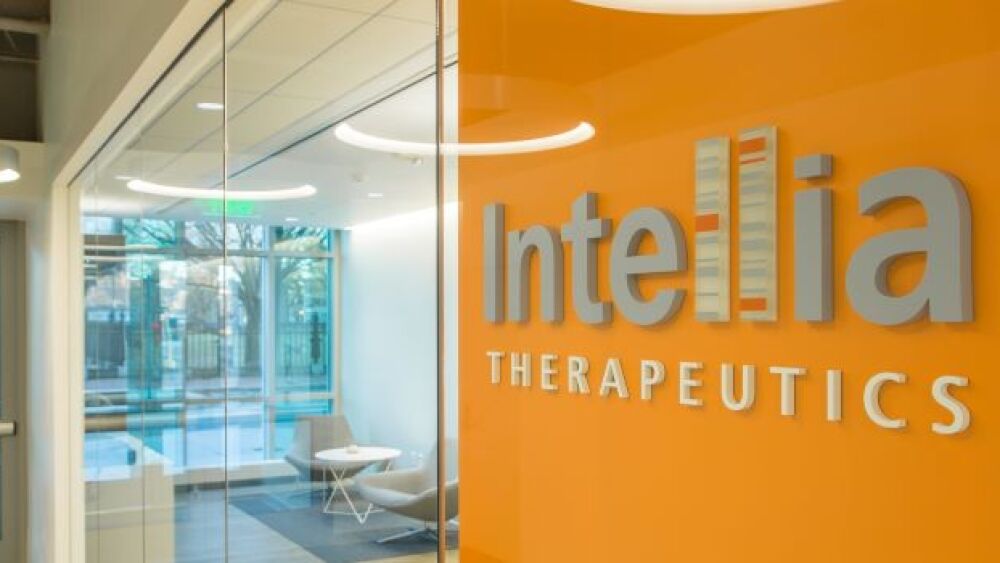Intellia Therapeutics reported early, positive signs from its in vivo gene therapies for both transthyretin (ATTR) amyloidosis and hereditary angioedema Friday.
Courtesy of Intellia Therapeutics
Intellia Therapeutics reported early, positive signs from its in vivo gene therapies for both transthyretin (ATTR) amyloidosis and hereditary angioedema Friday.
The data released from the two early-stage programs represent a major milestone for each disease space and validate the company’s in-vivo-based CRISPR platform, John Leonard, Intellia’s chief executive, said in a conference call.
“This clinical validation supports rapid expansion of our pipeline, instilling confidence in our ability to address a range of both rare and prevalent genetic diseases,” he stated.
Intellia highlighted interim data from the cardiomyopathy arm of the Phase I study of NTLA-2001. The CRISPR therapy provided deep and sustained mean serum transthyretin (TTR) reductions of 93% and 92% at 28 days following treatment, the company shared. The reductions in serum TTR were sustained throughout the observation period, which ranged from two to six months, Intellia noted. The cutoff date for this period was July 1.
Leonard said the data support the potential of the therapy as a one-time treatment to permanently inactivate the TTR gene and reduce the disease-causing protein in ATTR patients with cardiomyopathy (ATTR-CM).
He added that the initial results from this analysis support the company’s belief that NTLA-2001 has the potential to halt, or even reverse the underlying cause of ATTR-CM. Intellia aims to advance the therapy into Phase II upon completion of this trial.
The study assessed two doses of NTLA-2001, both of which were well-tolerated. Intellia will move forward with a fixed dose comparable to the 0.7 mg/kg level for evaluation across both arms in the ongoing dose-expansion portion of the study. This is due to similar TTR reductions seen at both dose levels.
Intellia is developing NTLA-2001 in partnership with Regeneron.
Prof. Julian Gillmore, a researcher at the Centre for Amyloidosis and Acute Phase Proteins at University College London who collaborated on this study, said there is a high unmet need for these patients. He noted the current standard of care only slows progression of this fatal disease.
During Friday’s call, Gillmore explained that deeper TTR reductions will result in better clinical outcomes for these patients.
“The more one knocks down the concentration of the relevant protein - in other words the rate of amyloid production - the greater the equilibrium in favor of amyloid removal,” he said.
George D. Yancopoulos, president and chief scientific officer of Regeneron, said the “profound and sustained serum TTR reductions” bolster the prospects for a one-time, in vivo treatment for multiple ATTR patient groups.
HAE Attacks Reduced by 91% at 16 Weeks
Intellia also shared data from its ongoing Phase I/II trial assessing NTLA-2002, a CRISPR-based therapy for hereditary angioedema (HAE), a rare genetic disease characterized by severe inflammatory attacks.
The therapy is designed to knock out the KLKB1 gene in liver cells, thereby reducing the production of kallikrein protein.
Interim data from that study showed two dose levels of NTLA-2002 produced a 65% and 92% mean reduction of the plasma kallikrein enzyme at eight weeks. Dose levels were 25 mg and 75 mg doses, with the larger dose generating the higher levels of reduction.
HAE attacks were reduced by 91% in the 25 mg dose cohort after 16 weeks, the data showed. Two of three patients remain attack free since treatment with the third patient attack free after 10 weeks through the latest follow-up, the company noted. Patients in the 75 mg cohort have not completed the primary 16-week observation period.
Leonard said Friday that NTLA-2002 has the potential to permanently prevent the debilitating swelling attacks associated with hereditary angioedema with a single dose treatment. The Phase II portion of the study is expected to begin in 2023.
Leonard noted that these programs serve as springboards that show the full potential of CRISPR gene editing.
Featured Jobs on BioSpace





